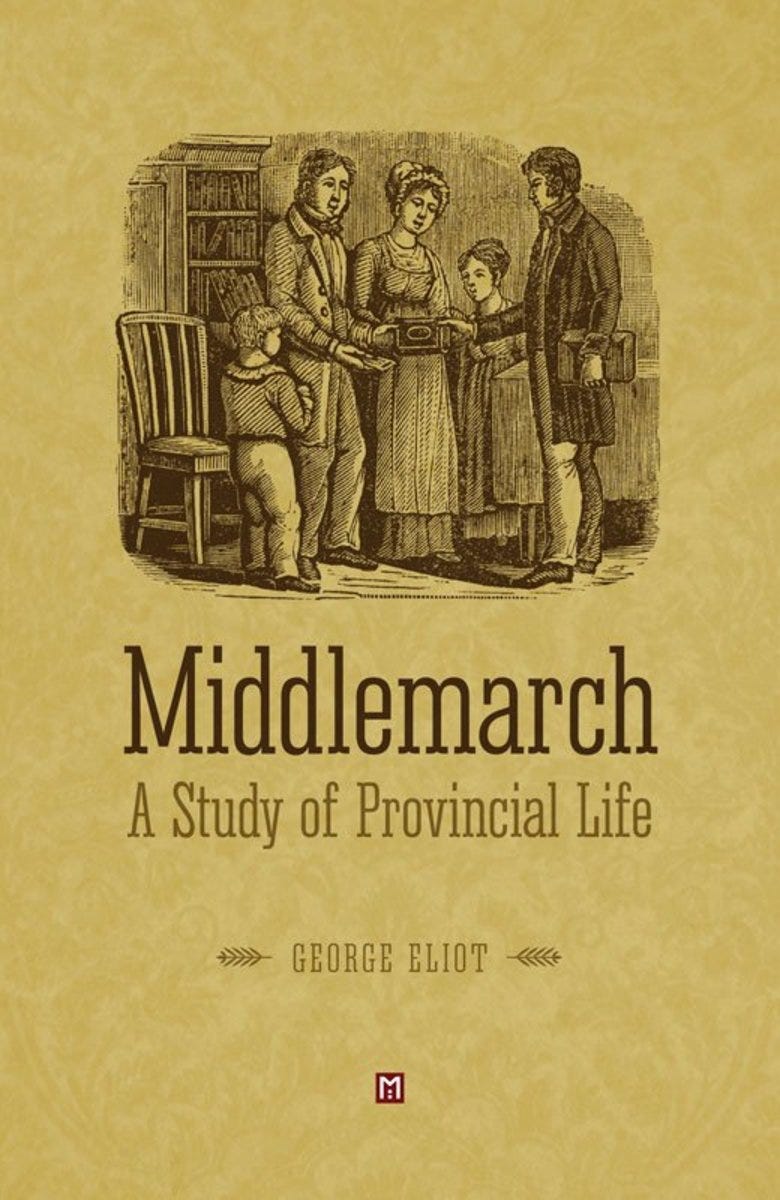One can begin so many things with a new person
even begin to be a better man
A passage from Middlemarch:
One of Lydgate’s gifts was a voice habitually deep and sonorous, yet capable of becoming very low and gentle at the right moment. About his ordinary bearing there was a certain fling, a fearless expectation of success, a confidence in his own powers and integrity much fortified by contempt for petty obstacles or seductions of which he had had no experience. But this proud openness was made lovable by an expression of unaffected good-will. Mr. Bulstrode perhaps liked him the better for the difference between them in pitch and manners; he certainly liked him the better, as Rosamond did, for being a stranger in Middlemarch. One can begin so many things with a new person!—even begin to be a better man.
The background: when he meets Lydgate, Bulstrode has for many years been stuck in patterns of selfishness and ambition, too weak to be noble. Lydgate, an idealistic young doctor, is new to town: as a stranger to Middlemarch and a new friend, he is not a part of these old patterns for Bulstrode. Maybe, he hopes, Lydgate can help him break the pattern.
Two conjectures about what's going on here:
(1) How we are perceived by our friends has a huge influence on how we perceive ourselves
(2) How we perceive ourselves has a huge influence on how we behave.
I think that (2) is extremely plausible. "I would (not) do that. That's (not) the sort of person I am" seems, anecdotally, to be an extremely useful motivator. And indeed, psychology has names for this like "identity-congruent behaviors". Of course, sometimes we just warp the evidence in order to maintain our self-conceptions: “I’m not a selfish person, so that thing I did must not have been selfish”. But another straightforward way to maintain our self-conceptions is to act in accordance with them, and that is often what we do.
(1) is less certain, but I still find it plausible. There will obviously be a lot of correlation between how our friends see us and how we see ourselves, but is there more? Here's a story: Our friends often know us better than ourselves. And we know this to be true on some level. And so their opinions about us really shape our self-conceptions a lot. So a comment from a friend that you are gracious can be a big part of you forming a self-conception as gracious. This self-conception might make graciousness much more salient and important, and thereby make you more gracious. Or a comment from a friend that you are disorganized might lead you to think that you just are disorganized, make you give up on changing that. [Obviously, negative comments from friends can often eliminate rather than reinforce behavior. Not all comments will lead to this entrenchment].
If you put the two conjectures together, then they entail how our friends see us can have large influences on behavior, for good and for ill. That’s why one can begin so many things with a new person.
So one of the most pernicious things a friend can do is to conceptualize you as just being a certain negative way: flaky, selfish, irritable. “He’s late again. That’s just how he is.” And one of the most precious things a friend can do is to conceptualize you as being a just being a certain positive way: “Of course she was there for you when you needed her. That’s just how she is.”
Advice: Try to perceive the best qualities of your friends, and help them to think of themselves in terms of those qualities. When it's true, say "that's so you" when they do something characteristically good. Meanwhile, avoid talking about or to them in ways that encourage them to think of themselves as defined by their flaws, or doomed to them.


What beautiful advice. Middlemarch was my grandma's favorite book.
Another Middlemarch line on this topic is, "people are almost always better than their neighbors think they are." This is expressed by idealistic Dorothea rather than the narrator, so it's unclear whether Eliot "really" believes it.